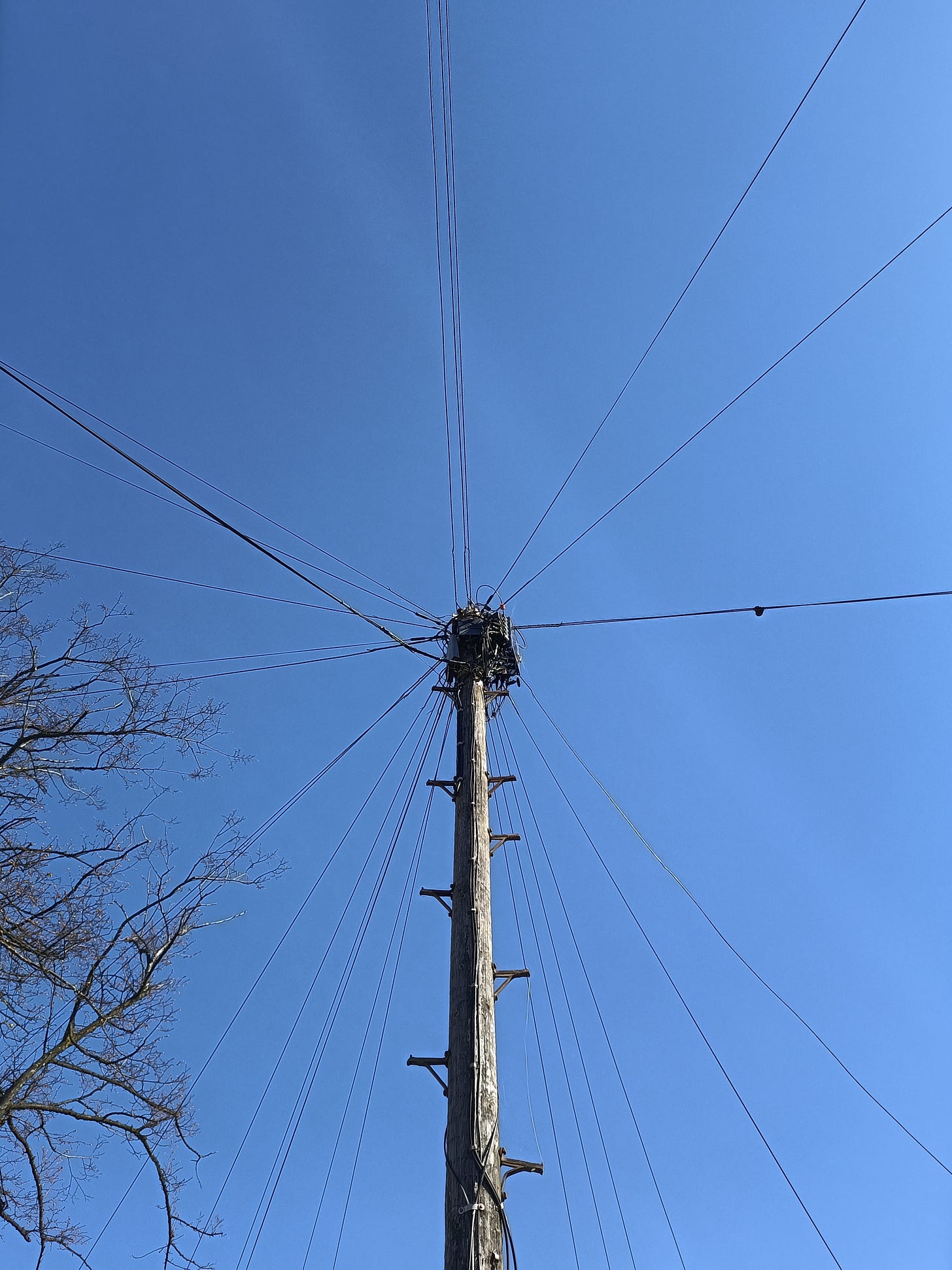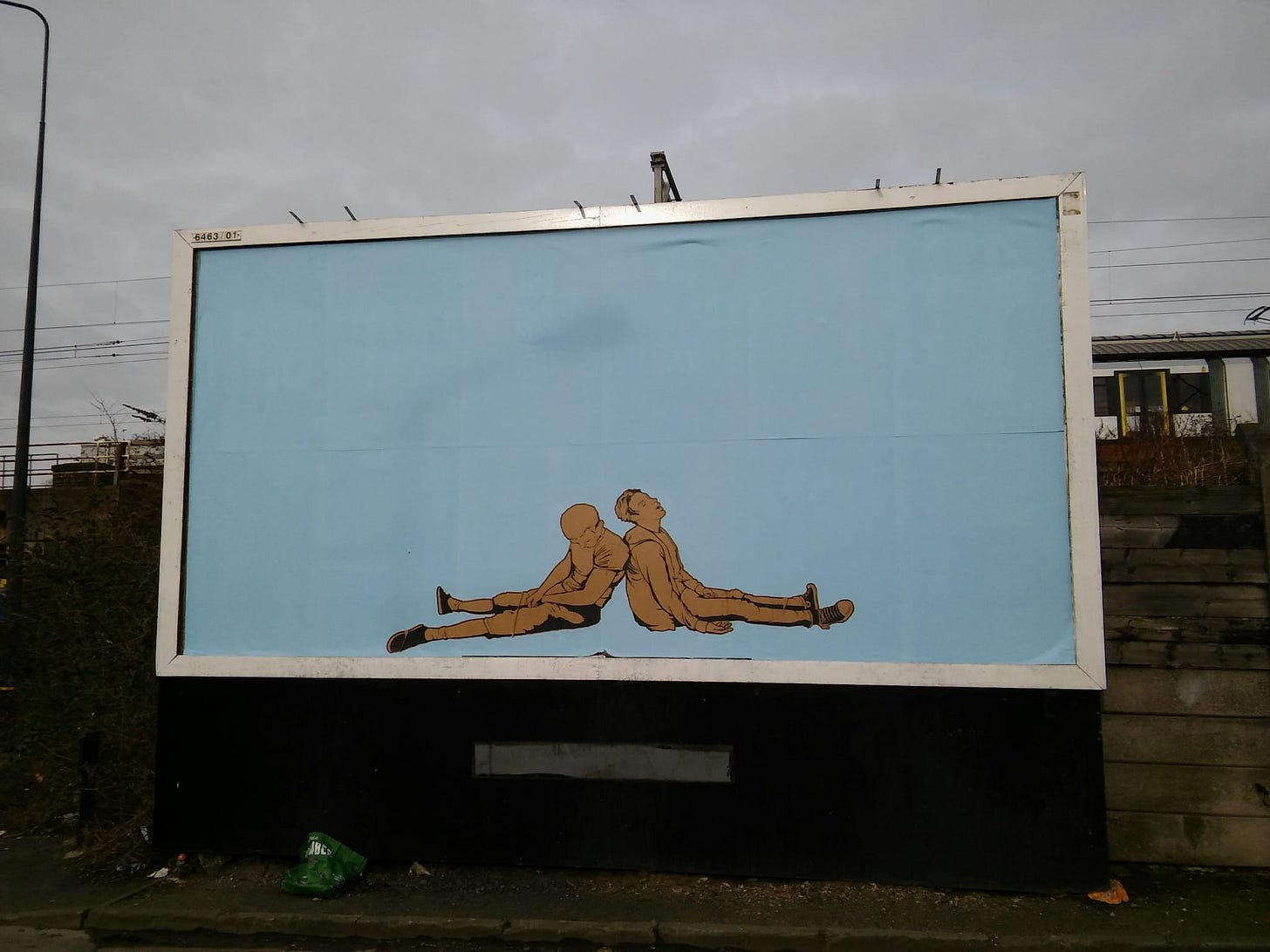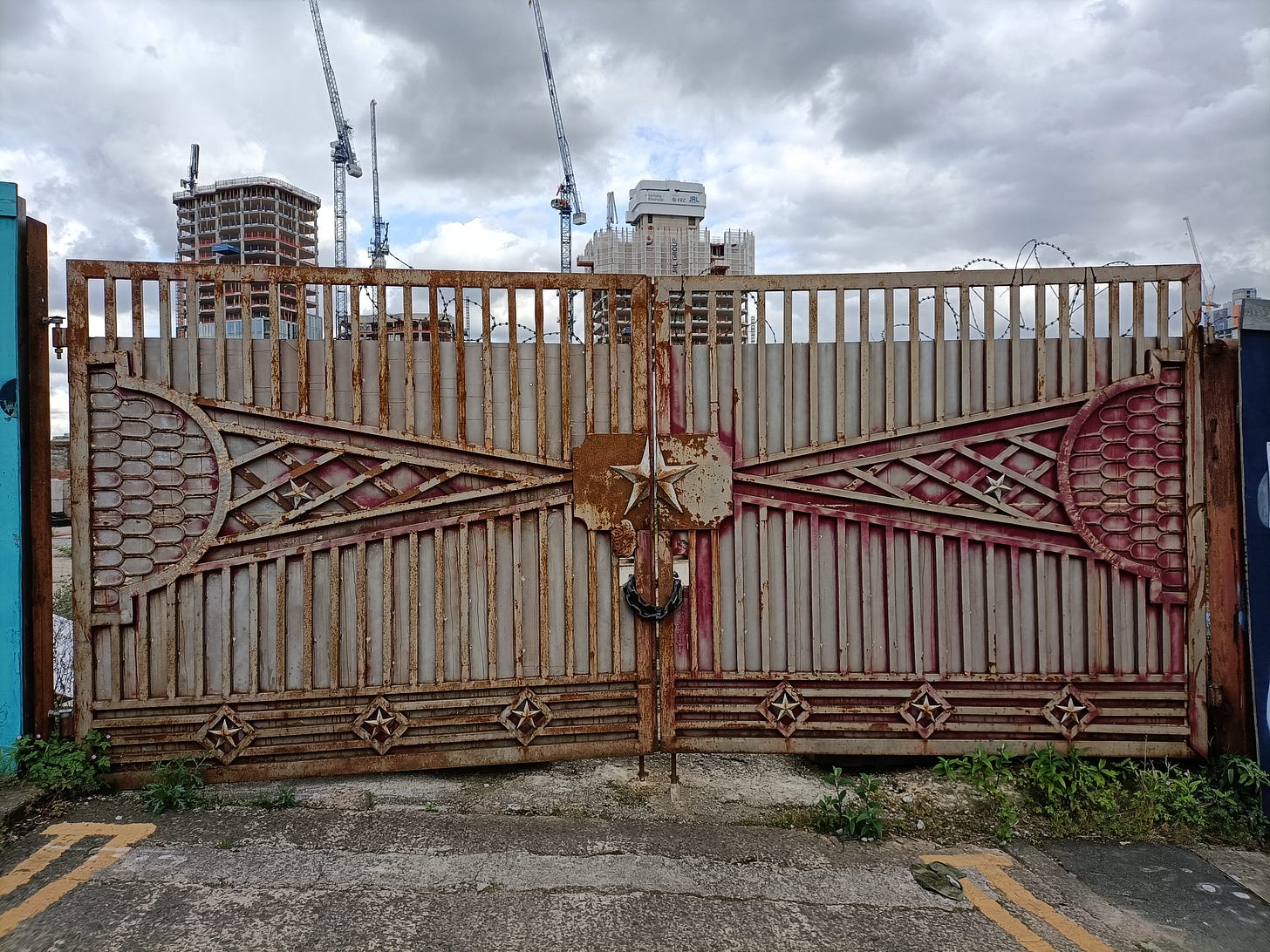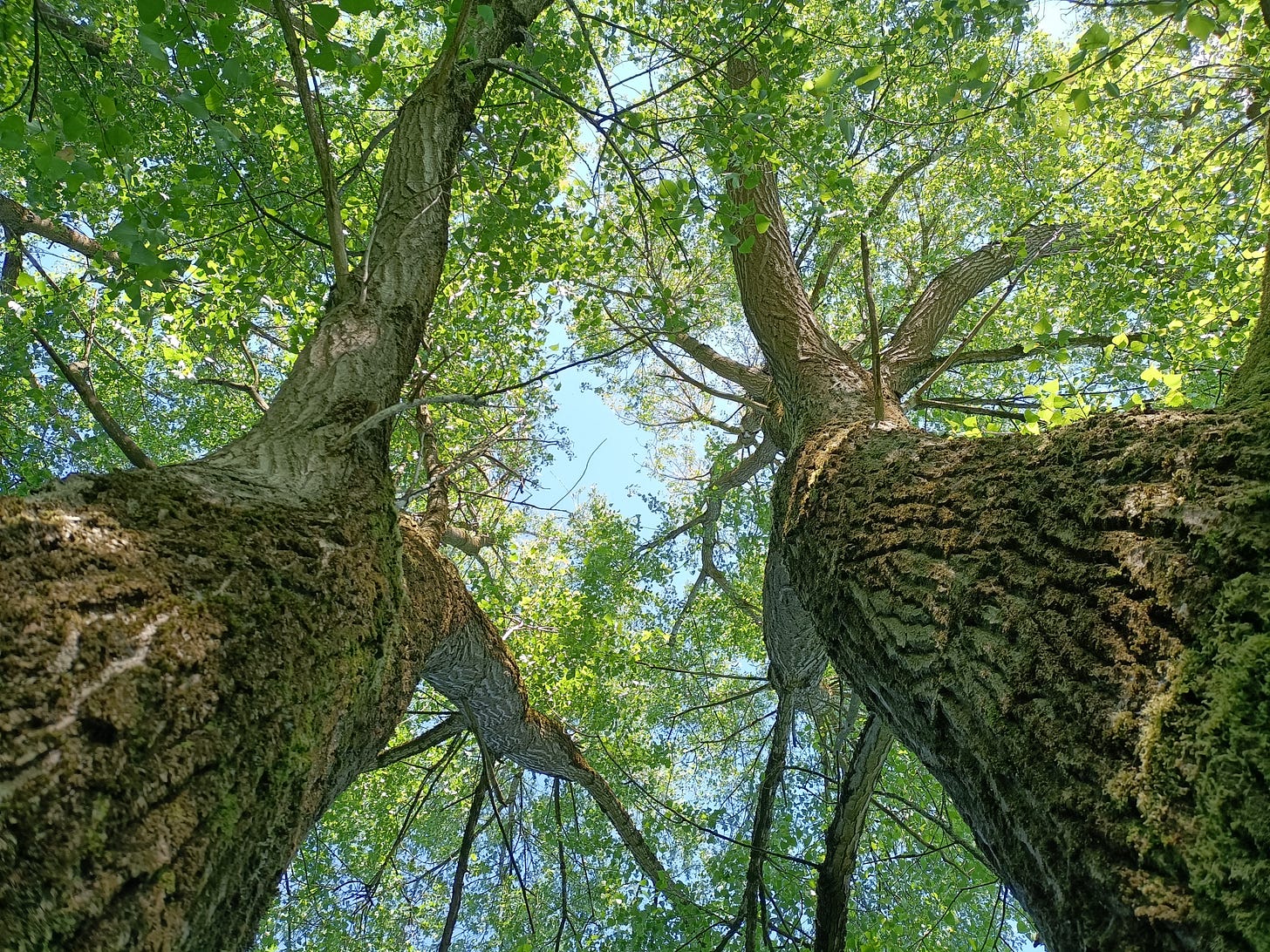Welcome to A Wild Green Heart. It's a lovely thing to have you visiting this space, so thank you for being here.
I'm writing this week from a place of ongoing struggle and overwhelm. I wrote last week about a particularly difficult period, in which friends, natural spaces, stories, and the fires of Beltane had all helped me to remain as grounded as possible among the turmoil.
Then I was blessed with three whole days in which to switch off completely. My best friend visited for the weekend. It was my younger son's birthday: his older brother came over, we went out for simple, delicious food together. We watched movies, we wandered at Pomona and strolled along the canal into town. I allowed my usually firmly-held routine to be disrupted, and I didn't let myself be concerned with anything going on beyond this beautiful bubble. It was very welcome, and much needed medicine. Sometimes things that are planned weeks in advance can end up being perfectly timed in ways we couldn't have anticipated.
Since leaving this bubble, my body has been deeply fatigued. Some of the overwhelm of personal events has crept back in, setting my nervous system on edge once again. And also: it seems as if there's something more going on as well. Something that feels deeply personal, but which also carries a sense of collective energy, which in turn causes the individual struggles to feel all the more amplified. It seems, from my perspective, and from speaking to others about this, that there is a great friction going on in the interpersonal relational field, the collective unconscious, or however you best understand the broader human psychic energy. Friendships, communications, and the bond of trust feel as though they are under threat. I wonder if anyone else out there is feeling this?
I'm not going to delve here into the detail of particular personal struggles, either my own or other people's. However, what I've been noticing over the last couple of weeks is a greatly increased sense of actual or perceived risk to friendships. Miscommunications and misinterpretations of messages or events. People feeling hurt or betrayed by others. People questioning whether the trust they have placed in people is strong enough to survive.
I've experienced this on a few fronts myself, and I've found my experience mirrored in several of the friends that I've talked to lately. It all feels like a lot. But I'm also convinced this is a struggle we must attempt to navigate with all the love and attention we have. For what is life without friendship? How can anyone navigate the challenges of life without community? And what if how we navigate our personal relational issues has an impact far beyond ourselves, for the benefit of the wider human community? I for one believe this to be the case.
This post feels like another departure from my usual writing here on Substack, in that it all feels very alive and unresolved, and I'm not sure what I have to offer people by way of practice or support. However, I've learned that both being witnessed in my own vulnerability, and witnessing others likewise, is a hugely important practice in the building of meaningful connection and friendship. So I guess I'm hoping that, at the very least, other people might read this and think, “Oh! THIS is exactly what I've been feeling lately! I thought it was just me.” In other words, I'm writing to offer the hand of solidarity to your shoulder, albeit from a place of great uncertainty and feeling shaken.
Writing also really helps me process my internal mess, so if nothing else at least my mind might feel clearer! So let me attempt to gather some coherent thoughts around this morass of raw feeling. The act of finding words for all this will help me; and if it connects with anyone else out there, all the better.
“Interdependence” by Sneak
Firstly, I feel like I need to be incredibly clear in this moment: if you are a friend of mine and you're wondering if any of this is about you, I can assure you: unless we're already in conversation about it, it isn't! In these difficult days I'm enacting a practice that is as painful as it is useful. If I'm feeling uncertain about something in a friendship, or if I'm carrying any feelings of upset or hurt, I'm making sure to express that to the individual concerned as kindly and as clearly as I can. The way I'm wired,1 combined with the overwhelm of late, mean this can feel pretty horrific. But I recommend it. I don't like to be left wondering, and I don't want to leave others feeling that way.
I've witnessed other brave friends doing the same thing this week: articulating how a particular behaviour or lack of support has caused them hurt. And I've seen other wonderful people on the receiving end of such honesty. It can elicit all the deepest feelings associated with childhood traumas, unhealthy patterns of relating, and damaging family experiences. But it can only serve to strengthen friendships that are worth their salt. The practice requires courage, but also an openness and softness that can feel at odds with the strength of the emotional landscape.
But there's also a paradox at work here. Because for most of us, there exist one or more relationships that genuinely aren't safe, and need to be treated with strong, secure boundaries. It might be a parent, an ex, or a friend stuck in cycles of damaging behaviour. It'll be different for each of us, but I think you know what I mean. The people that seem to only cause you harm, without doing you any good. It requires a very different energy to that of navigating a hurt or miscommunication in an otherwise healthy friendship. Personally I'm dealing with both of these energies at the same time. And let me tell you, if I find “speaking my real feelings in the face of potentially causing upset” difficult, it's nothing compared to the excruciation of stating hard boundaries and then holding them. I feel a bit sick just writing about it.
As is often the case I've been finding Ian Siddons Heginworth’s writing in Environmental Arts Therapy and the Tree of Life full of useful, well-rooted wisdom. This month's tree in the Celtic calendar is oak, and oak is providing a helpful example to me around this need to hold softness and refuge alongside hardness and protection:
As we step through the doorway of oak these issues of power, its use and its abuse, are brought into the light. It is the facing of these demons within us that makes us into conscious adults. The castle that we seek to build is both strong on the outside and soft and welcoming within. It rules over its kingdom with a gentle and compassionate hand but it repels invaders with an impenetrable force. Only by becoming conscious of old patterns of power and control can we choose to change them and so not inflict our wounds on others weaker than ourselves. Neither will we fail to defend ourselves nor fail to speak our truth when we need to.
I'll leave this train of thought for now, because everything I've been trying to say seems beautifully contained within that short piece of text. Trees are good teachers and excellent friends. So let's turn to the theme of friendship, specifically between humans, and explore it a little more.
Friendship
In January, as I wrote about at the time, I attended a gathering on the theme of Friendship. I was there to offer art and workshops focused on how we can befriend places and other-than-human creatures. But the majority of the time was, quite naturally, focused on friendship between humans.
One theme that landed deeply with me was that of ruptured friendships. I listened to a few different people speak, within the safe container of structured small groups, about friendships that had been broken, leaving them with little sense of why it had happened, and in some cases with no way left to communicate about it or to try to restore what had been cut off. I was very moved by these conversations, and felt grateful that I didn't have any such experiences. Until, still reflecting on all this back home, I realised that I did.
In the end, moved to address one such rupture (a friendship that had been very close for fifteen years, then silent for more than four) I reached out to test the waters. I was concerned that I had perhaps unwittingly said or done something to hurt them, and caused them to withdraw. I also needed to express my own hurt at the lack of communication, which had started in a period that was very challenging and dark for me, and to ask whether our connection could be restored. The responses I received were kind, but also curiously clinical. Nothing had happened to cause the fracture; they had simply felt it was time to “let me go.” Could we pick up where we left off? “No hard feelings - but no.”
I was left with a peculiar blend of emotions. I had done everything I could possibly do to attempt to restore this friendship, even though I knew it would likely feel awkward and difficult. But there was no way left to go, forward or backward.
It was a tricky thing to process, but as always it left a simple choice: allow myself to feel it all; or repress the feelings and let something unpleasant fester beneath my conscious awareness. The one thing I noticed when I turned my attention to it all was a root of bitterness. I'm painfully aware of what just a small amount of bitterness can grow into if it isn't addressed early on.
Mine spoke in this manner: “Fuck your ‘no hard feelings’. Let's just hope you never need anything from me in future, because you won't get it.” I had to acknowledge that this wasn't helpful - for me, for my no-longer friend, or for humanity. It took some determination to ease my grip on this last remaining piece of self-protective impulse; but I noticed that when I did let go, grace flooded in and caused a change in my heart that I couldn't have made for myself. Grace is like that. I'd be totally fucked without it.
As I've said before, I don't really read the bible these days. But there are pieces of it lodged in my body from the years in which I read it often, and I'm usually grateful when one of these fragments makes itself known. In this instance it was a verse from chapter 12 of the letter written to the Hebrews, where we find both bitterness and grace mentioned, alongside the notion that unchecked bitterness can affect more than just the one holding it:
Look after each other so that none of you fails to receive the grace of God. Watch out that no poisonous root of bitterness grows up to trouble you, corrupting many.
Which takes us nicely back into the broader realm of societal human relationships and the collective psyche. Once again, I found a passage in the May chapter of Environmental Arts Therapy and the Tree of Life to be of help. It's another insightful reminder of how these most personal relational challenges impact the whole of society. Ian Siddons Heginworth is initially writing specifically about the cycles of abuse that can be perpetuated from parent to child in family systems, but he also makes a clear link to how these patterns are pertinent to much wider communities. He writes:
If we encounter abuse or neglect as children… we tend to recoil from the pain of it and may take refuge in the masculine, in keeping busy, striving and achieving, distracting ourselves from ourselves. The more we run, the more we find hiding places in the dark masculine where there is no feeling, and there we stand a chance of becoming an abuser ourselves…
We are being called home to ourselves and if we do not find courage to look within and own our pain, then another innocent may suffer and the legacy continue.
The men and women who abuse the innocent, do they not carry this shadow for all of us? We call them monsters, but are they not the outward manifestation of the demons that lurk within each of us, the jagged edge of a cultural wedge of which we are all a part? If we ignore the demons within ourselves surely someone, somewhere will succumb to possession on behalf of us all…
As long as our culture celebrates the masculine and represses the feminine, we will be driven to push constantly against our edges in order to feel anything. So the media becomes more violent and pornographic, pornography becomes more abusive and abuse becomes more commonplace. Only a return to the feminine, to the honouring and release of feeling, can stop or reverse this process.
“Planet Earth is Looking Pretty Fucking Weird Right Now” by Sneak
So I'm left convinced once again about the close relationship between the micro and the macro. Between the work of the individual human soul and the collective psyche. There's definitely some difficult and unsavoury stuff happening at the collective level in these turbulent times. You'd have to be wilfully blind not to see it. But we can only really work this stuff through in individual relational ways. Or perhaps it is more true to say that we can't really do useful community-building work in society without first attending to the needs and feelings of our own relationships.
And, of course, I'm also reminded of the importance of honouring the feminine - both the part of ourselves that feels deeply, and requires ample space for that; and within our communities and cultures, where women's voices are still often marginalised, dismissed or shouted over by men's brusque tones. But, as oak and all the natural world teaches us, this is not yearning for a matriarchy instead of a patriarchy. Rather it is about ensuring the masculine and feminine energies and traits within each of us are in healthy balance.
The work of embodying and integrating both of these is often referred to as “The Sacred Marriage”, and it is a lifelong work. Living in a culture that lacks rites of passage for our adolescents, and in which genuine elders - who can hold and oversee such things - are few and far between, means that this work is often unknown and completely neglected. One of the reasons I really appreciate the Environmental Arts Therapy book is that it brings us back to this work of this inner integration time and again, through the lenses of each month, their trees, the Celtic fire festivals, and nature-based practices.
The Tree of Truth and Love - a personal exemplar of the Sacred Marriage
Relationships Good Enough to Trust
This is how my friend David Benjamin Blower describes friendship - a definition that I find immensely valuable. It strikes me that both in the wider social and political climate, and in the immediacy of my life and the lives of my friends, it is precisely “relationships good enough to trust” that feel under threat. And precisely these that require my closest attention, my deepest love, my chosen kindness, my fiercest loyalty.
I don't know where I'd be without my friends. I love them immensely, and I'm continually challenged to discover how I can be a better one in return. The older I get, the more this work reveals itself to me as the most important thing I can do with my life, alongside parenting and loving the Earth. It's also why anything that threatens to rupture these relationships good enough to trust feels so distressing. It's a subject matter I imagine I'll return to again and again here.
Unsure quite how to wrap this up, I find myself turning to T.S. Eliot. This week, thanks to my best friend, who visited a week ago, I once again have a copy of Eliot's Four Quartets, which ranks in my mind as one of the finest books of poetry ever written. It's essentially one long poem, divided into four pieces: Burnt Norton, East Coker, The Dry Salvages, and Little Gidding. While it contains many passages that are incredible in their own right, it's really a book that demands reading and absorbing as a whole. The way Eliot weaves his themes together and returns repeatedly to specific metaphors is exquisite.
For those who, unlike me, can stand to read at length from a screen, the whole book is available online in various places, including here. I finished reading it last night, so I'm going to end with a small portion from the final quartet, Little Gidding.
There are three conditions which often look alike Yet differ completely, flourish in the same hedgerow: Attachment to self and to things and to persons, detachment From self and from things and from persons; and, growing between them, indifference Which resembles the others as death resembles life, Being between two lives—unflowering, between The live and the dead nettle. This is the use of memory: For liberation—not less of love but expanding Of love beyond desire, and so liberation From the future as well as the past.
May we all be saved from indifference.
Thanks for reading. As you can probably imagine, I'm especially keen to hear back from folk who've had recent experiences of relational turmoil, particularly those who've been impacted by it on multiple fronts, or who are noticing it more broadly. But naturally, I'd love to hear in the comments from anyone! What resonates with you in this post? What else has it brought to your attention? Wild Green Blessings upon you all!
I'm an enneagram 9. I thrive on internal peace, but this requires everyone else being at peace too! Combined with my hypervigilance - which makes me adept at reading the emotional state of anyone in a given space - this puts quite a bit of pressure on my system. It makes me a good mediator and peacemaker. But it also meant for a long time I was dependent on helping everyone find resolution. It also means the real work for me has been figuring out what I actually want (much harder than it sounds to a non-9!) and acting on that, even if some people are upset by it.





















Share this post